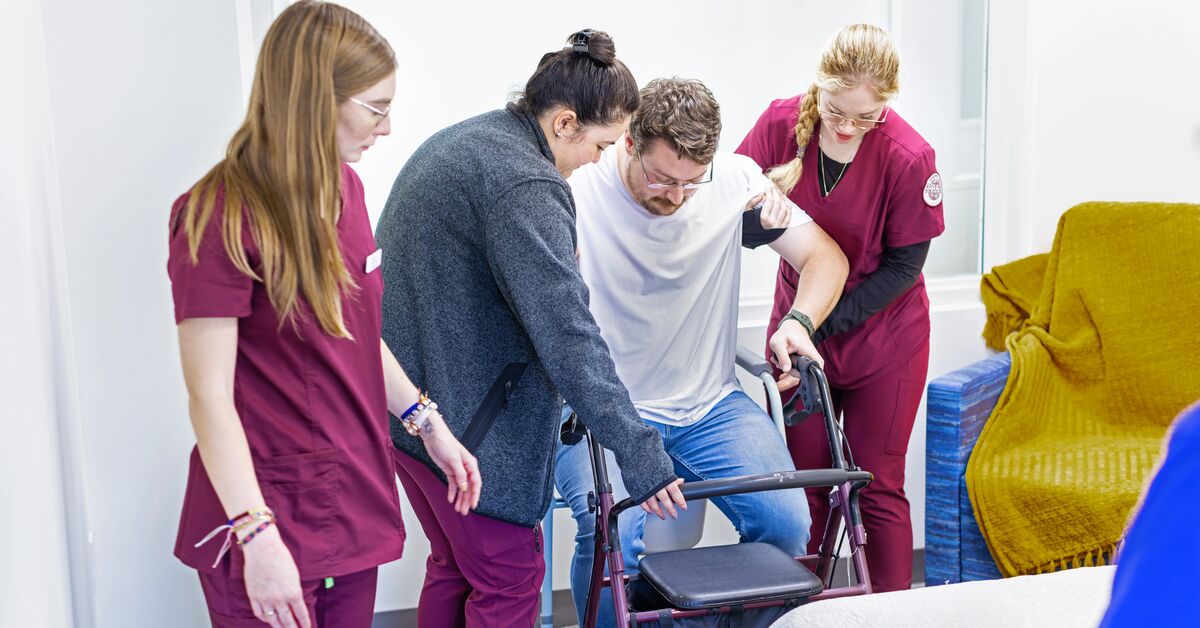Is Hospice Nursing Right for Me?
Every day, our society grows older and the need for compassionate hospice nurses becomes more urgent. With 1 in 5 of Americans expected to be 65 or older by 2030, demand for end-of-life care is surging. An aging population facing life-limiting illnesses means hospice nurses are indispensable; they step in at the final stage of life to provide comfort, dignity and guidance. In fact, as more people require hospice services, the demand for skilled hospice caregivers is rising in tandem.
If you’ve ever felt drawn to caring for others during life’s most vulnerable moments, you may be wondering, “Is hospice nursing right for me?” This blog will help you answer that question by exploring what hospice nurses do, the hospice nurse qualifications and training needed (including how to become a hospice nurse for those changing careers), the hospice nurse salary and job outlook and the personal traits that make someone well-suited to this challenging but deeply rewarding field.
What Does a Hospice Nurse Do?
Hospice nurses are registered nurses who specialize in caring for patients with terminal illnesses, focusing on providing comfort and quality of life during a patient’s final days or months, rather than curing the disease. Their day-to-day responsibilities can be both technical and profoundly human.
Common hospice nursing duties include:
- Managing pain and symptoms: Administering medications (especially pain relief), oxygen therapy and other interventions to keep patients as comfortable as possible. Hospice nurses are experts in palliative care techniques, easing pain, shortness of breath and other end-of-life symptoms.
- Monitoring patient health: Checking vital signs and observing changes in condition daily. Hospice nurses track symptoms and look for signs of decline or discomfort that need intervention.
- Wound and personal care: Tending to wounds or bedsores and helping with personal care needs. For patients who are bedbound or incontinent, hospice nurses provide gentle skin care and repositioning to prevent discomfort.
- Educating and supporting families: A hospice nurse teaches family members about the dying process, coaches them on caregiving tasks and offers emotional support. They often discuss difficult topics, such as advance directives or what to expect in the final days, helping loved ones prepare.
- Coordinating care: Hospice nurses serve as care coordinators, communicating with physicians, pharmacists, social workers, chaplains and other members of the hospice team. They ensure everyone is informed about the patient’s status and that the patient’s and family’s needs are met holistically.
- Advocating for patient wishes: Perhaps most uniquely, hospice nurses strive to honor each patient’s end-of-life wishes. For example, one Maine hospice nurse and her team went so far as to film the ocean shoreline and bring in sand and wave sounds so a bedridden patient could “visit” the beach one last time. Such acts, while not found in any nursing textbook, highlight the lengths hospice nurses go to provide peace and dignity.
Hospice Nursing Work Settings
Hospice nurses work in many environments, such as private homes, dedicated hospice facilities, nursing homes, assisted living communities and hospitals. Wherever they practice, the goal is the same: easing suffering and supporting quality of life. In home care especially, hospice nurses often enjoy greater autonomy than hospital nurses, making interdependent decisions while serving as the “eyes and ears” of the care team. They collaborate closely with physicians, nurse practitioners, social workers, chaplains, aides and volunteers to provide holistic care. Ultimately, hospice nursing blends clinical skill with the compassion of a counselor and the advocacy of a trusted friend.
Hospice Nurse Qualifications: Education and How to Become a Hospice Nurse
For those exploring how to become a hospice nurse, it’s important to understand the educational path and credentials required. First and foremost, a hospice nurse must be a licensed registered nurse (RN). That means you’ll need to complete nursing school and pass the RN licensure exam. There are a few education routes to reach RN licensure:
- Bachelor of Science in Nursing (BSN): A four-year undergraduate nursing degree. Many hospice nurses hold a BSN, and the BSN is increasingly preferred for nursing positions because it includes expanded training in leadership, research and community health.
- Traditional BSN: Designed for first-time college students, typically completed in four years.
- Accelerated BSN (ABSN): A format of the BSN for students who already hold a non-nursing bachelor’s degree. Programs like the hybrid ABSN offered by Saint Joseph’s College of Maine condense coursework and clinicals into a fast-paced format (often 12–18 months) allowing career changers to earn their BSN and become RNs more quickly.
- Associate Degree in Nursing (ADN): A two- to three-year college program that prepares you for the NCLEX-RN licensure exam. An ADN is the minimum to become an RN, though ADN-prepared nurses often go back to earn a BSN later. Some hospice employers may prefer a BSN, but ADN nurses can certainly work in hospice.
After completing an accredited nursing program, the next steps are to pass the NCLEX-RN exam (the national licensing exam) and meet any state-specific licensing requirements (such as a background check). Once licensed as an RN, you are officially qualified to work as a nurse, including in entry-level hospice nurse positions.
Can new nurses go straight into hospice?
Yes, some do, especially if hospice care is their passion. Many hospice agencies offer residency programs or mentorship for new graduate nurses. However, some employers prefer or require a year or two of general nursing experience (for example, in medical-surgical or critical care units) before hospice nursing. Gaining acute care experience can build a strong clinical foundation, but it’s not an absolute must for everyone. The key is competence and comfort with autonomous decision-making.
Hospice Nursing Certifications
While not mandatory, obtaining hospice-specific certification can enhance your credentials. The most recognized is the Certified Hospice and Palliative Nurse (CHPN) certification. To earn the CHPN, an RN usually needs at least 500 hours (about 6 months full-time) of hospice/palliative nursing practice in the prior year (or 1,000 hours in the prior 24 months) and must pass a certification exam. The CHPN credential, administered by the Hospice and Palliative Credentialing Center, validates your specialized knowledge in end-of-life care. Other certifications exist for niche areas (such as the CHPPN for pediatric hospice nurses, or the ACHPN for advanced practice hospice nurses), but for a bedside RN, CHPN is the gold standard. Some employers will even pay for their hospice nurses to get certified.
In summary, the hospice nurse qualifications can be summed up as:
- Earn a nursing degree through an approved program (traditional or accelerated BSN).
- Obtain RN licensure by passing the NCLEX-RN exam.
- Gain experience in hospice or related care settings.
- Consider certification such as the CHPN to demonstrate specialized expertise.
Hospice Nurse Salary and Career Outlook
When weighing any career, it’s important to understand the financial and job stability aspects. Hospice nursing, as a specialty within registered nursing, offers competitive wages and strong growth potential. Let’s break down the hospice nurse salary expectations and what the future may hold for this career path.
Hospice Nurse Salary
Hospice nurses are registered nurses, so their pay is comparable to other RNs, often with a slight premium for specialized skills. According to recent data, the median annual wage for registered nurses in the U.S. was $93,600 as of May 2024. This includes RNs across all specialties. A hospice nurse’s earnings will depend on factors like geographic location, years of experience, education level (BSN-prepared nurses tend to earn more than ADN-prepared) and the type of employer (hospice RNs might work for non-profit hospices, for-profit hospice agencies, hospitals or home health companies).
Hospice Nurse Career Outlook
Job stability is high in this field, and a passionate hospice nurse is unlikely to be without employment options. The healthcare industry as a whole is growing, and nursing in particular remains in high demand. The U.S. Bureau of Labor Statistics projects that employment of RNs will grow by about 5% from 2024 to 2034, which is faster than the average for all occupations. This translates to roughly 189,000 openings for RNs each year due to growth and workforce turnover. Another indicator of strong demand: many hospice providers are currently struggling to recruit enough nurses to fill all their openings. One national study found that almost 80% of hospice facilities reported at least 20% of their nurse positions were unfilled, indicating a significant nursing shortage in hospice care.
Is Hospice Nursing Right for You? Traits, Challenges and Rewards
Success in this specialty requires emotional intelligence, resilience and a willingness to meet people at life’s most vulnerable stage. Consider whether these traits align with you:
- Empathy and compassion: Hospice nurses must be deeply caring and able to offer comfort even on hard days. Families never forget kindness shown during such moments.Comfort with end-of-life conversations: You’ll need to talk openly about death and grief, listening without discomfort. Many nurses find that this work reshapes their perspective on life.
- Communication skills: Clear, calm communication is essential for guiding families, simplifying medical details and coordinating with care teams.
- Emotional resilience: You’ll experience frequent loss in hospice nursing. Self-care, strong support systems, and healthy coping strategies are vital to prevent burnout. Many nurses find meaning in the work despite its sadness, and it’s wise to seek mental health support—through counseling or peer groups—to process the moral and ethical challenges that can arise in end-of-life care.
- Autonomy: Although hospice nurses operate in a close knit interprofessional collaboration with physicians, NPs and PAs, hospice nurses must feel confident making decisions in patients’ homes.
- Cultural openness: Respecting diverse spiritual and cultural beliefs is crucial to providing comfort and dignity.
Rewards and Challenges
The rewards are profound: intimate connections, gratitude from families and the fulfillment of providing dignity at life’s end. Many nurses find hospice aligns closely with their personal values and sense of purpose. Work-life balance in hospice nursing varies by setting. Inpatient hospice nurses typically work 24/7 rotating shifts, while home hospice roles may offer more predictable daytime schedules with fewer evenings or weekends. Either way, many organizations prioritize staff well-being and encourage time to recharge, knowing the emotional demands of the work.
The challenges are real, too. The emotional weight of loss, compassion fatigue and complex family dynamics require resilience and tact. Documentation and travel can add strain, and not everyone understands the value of hospice care; you may need to dispel misconceptions.
Even seasoned nurses will admit hospice is not easy, but most will also say it’s the most meaningful work they’ve ever done. As hospice professionals often say, “Hospice isn’t about dying; it’s about helping people live as fully as possible until the end.” Ask yourself: Do the rewards outweigh the challenges for me? If helping people live fully until the end resonates with you, hospice nursing may be the right career choice for you.
Accelerated Path to a Hospice Nursing Career with Saint Joseph’s Hybrid ABSN
If hospice nursing feels like your calling, the next step is to become a registered nurse. Saint Joseph’s College of Maine offers a hybrid Accelerated Bachelor of Science in Nursing (ABSN) program designed for career changers. In just over a year, you can build on your prior bachelor’s degree, earn a BSN, sit for the NCLEX and begin working as an RN.
The hybrid ABSN blends online coursework with on-campus labs and local clinical rotations. You’ll study core nursing subjects, such as anatomy, pharmacology, community health, and leadership, in an accelerated format that respects your prior experience. Students value the program’s intensity, supportive faculty and close-knit community. As one student shared, “The environment is just like a community... we’re just like a family.”
This program prepares you to take the licensure exam, with an NCLEX pass rate of over 95%. Graduates work across specialties, including hospice and palliative care, with clinical experiences that may expose you to hospice or geriatric settings. Throughout, Saint Joseph’s emphasizes a holistic, person-centered approach rooted in mercy and compassion—skills essential for hospice nursing.
Ready to become a hospice nurse? In just over a year, you could be that calming presence at a patient’s bedside. If hospice nursing is right for you, Saint Joseph’s can help you get there. Your future patients are counting on compassionate individuals like you.



